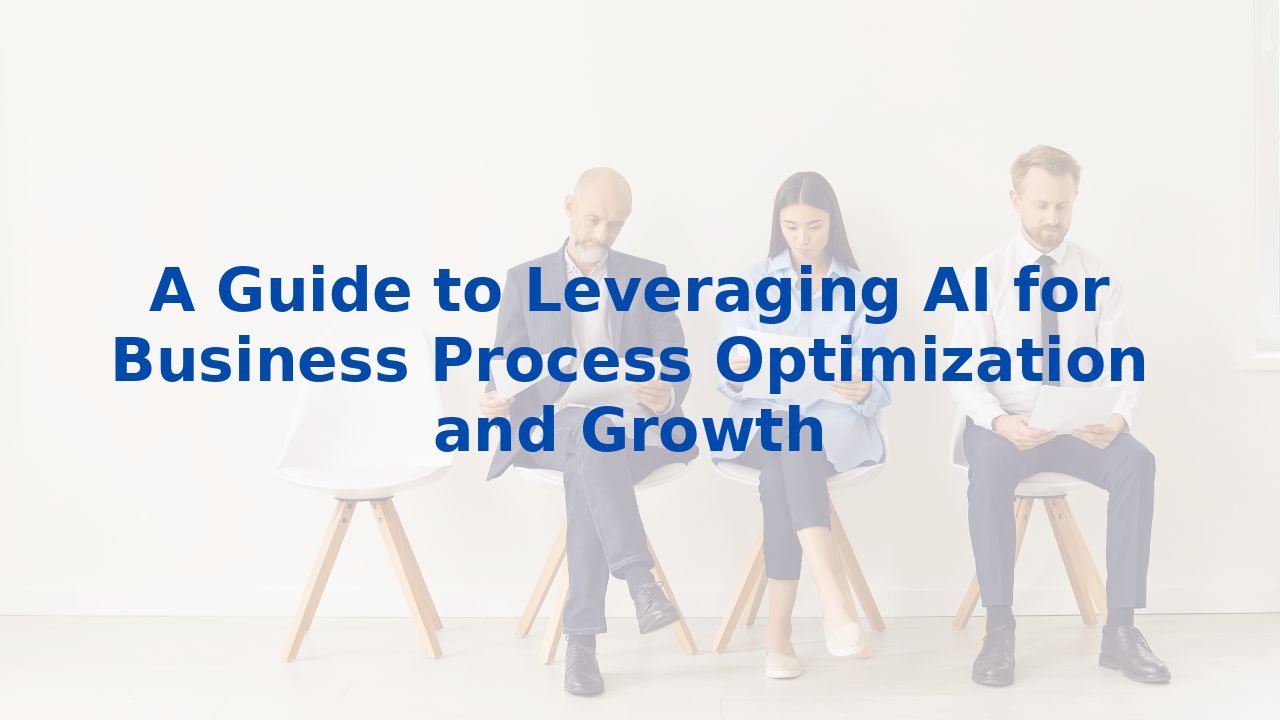A Guide to Leveraging AI for Business Process Optimization and Growth
Enhancing Business Processes with AI: A Guide to Efficiency and Growth
In an era where competition is fierce and time is a valued currency, businesses are compelled to seek innovative ways to streamline operations. Artificial Intelligence (AI) stands at the forefront of this movement, offering tools and solutions that can transform traditional business processes into optimized systems that drive growth. This guide will explore how AI enhances various business processes, the benefits it brings, and the importance of training employees for successful integration.
Understanding Business Process Optimization
Business process optimization is the art and science of enhancing workflows to make operations smoother, faster, and more cost-effective. When executed correctly, it can lead to substantial improvements in productivity, error reduction, and heightened customer satisfaction. The essence of optimizing processes lies in creating a streamlined network that not only fulfills operational goals but also aligns with broader organizational objectives.
The Role of AI in Business Process Optimization
At its core, AI serves as a powerful ally for business process optimization. Here are a few pivotal roles AI plays in this transformative journey:
Automation of Routine Tasks
AI shines in automating mundane, routine tasks that tend to drain valuable resources. By handling repetitive administrative functions, such as data entry and customer inquiries, AI enables teams to redirect their focus toward strategic initiatives that drive innovation.
Advanced Data Analytics
Businesses generate an overwhelming amount of data daily, and leveraging AI can turn this data into actionable insights. AI-driven analytics can pinpoint customer preferences, identify emerging trends, and inform marketing strategies by examining behavior patterns, ensuring that businesses remain agile and responsive to market demands.
Predictive Maintenance
Predictive maintenance, facilitated by AI, monitors equipment and operational performance, proactively identifying potential failures before they occur. By reducing unexpected downtimes, companies can significantly lower maintenance costs and ensure seamless operations.
Benefits of AI in Business Process Management
The integration of AI into business processes delivers a plethora of benefits, including:
Streamlined Workflows
AI's ability to analyze event logs and process execution can uncover inefficiencies, enabling organizations to target specific bottlenecks and improve overall workflows.
Improved Efficiency
What if you could not only save time but also improve quality? By automating repetitive tasks and eradicating human error, AI enhances operational efficiency and frees up employee time for high-value tasks.
Enhanced Decision-Making
AI facilitates data-driven decision-making by providing insights that reveal trends and predict business outcomes. This powerful analysis helps organizations navigate complex challenges and capitalize on opportunities with confidence.
Practical Applications of AI in Business Processes
AI is making significant inroads across various organizational departments, demonstrating its versatility:
Sales
Sales teams leverage AI to streamline administrative tasks, optimize lead prioritization, and enhance customer interactions. By personalizing the sales journey through predictive insights, AI effectively elevates engagement levels and conversion rates.
Customer Support
AI-powered chatbots and virtual assistants can handle a multitude of inquiries, providing immediate responses to customers. This not only enhances satisfaction but also allows human agents to devote their attention to more intricate issues.
Inventory Management
AI optimizes inventory management by analyzing consumption patterns and automating reorder processes. This data-driven approach minimizes surplus inventory and stockouts, ensuring that products are available when needed without human intervention.
The Importance of Employee Training for AI
While AI can revolutionize business processes, the investment in employee training is vital to unlock its full potential. Here's why:
Adaptability
An empowered workforce can navigate AI tools effectively, leading to smoother transitions and minimizing disruptions during implementation.
Problem-Solving Skills
Training employees creates a culture of continuous improvement. As they become adept at working with AI, they develop enhanced problem-solving skills that enable them to tackle complex challenges proactively.
Data Interpretation
An understanding of how to interpret AI-generated data insights allows teams to make informed and strategic decisions aligned with organizational goals, driving better results.
Continuous Improvement
Trained employees contribute significantly to ongoing optimization efforts, ensuring that AI systems evolve in tandem with business needs and market dynamics.
Conclusion
The strategic integration of AI into business processes transforms the way organizations operate, enhancing efficiency and fostering growth. By automating tasks, leveraging data analytics, and optimizing decision-making, AI is reshaping operational paradigms. Complemented by robust training initiatives, organizations can cultivate skills that maximize these technologies’ benefits, paving the way for a future that thrives on adaptability and innovation. Embracing AI is not just a choice; it's a pathway to sustained success in today's dynamic business climate.
For organizations eager to harness the power of AI, investing in comprehensive training programs can help equip their entire workforce with the necessary skills. Find out more about how to equip your team by visiting Complete AI Training.



